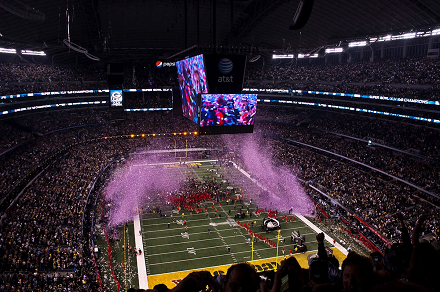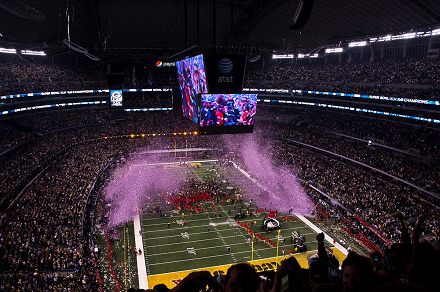

Well, despite the fact that some estimates went as high as 17 million sick days (valued at $1 billion in lost time and productivity) being taken the Monday after the game (and before you ask, no, a teenager’s change.org petition to move the game to a Saturday night won’t actually help), it’s just unlikely we’ll ever see it played on a Saturday. Here are the reasons:
The question comes up every year: All the way back in 2011, league spokesman Brian McCarthy told SI.com, “We hear this each year.” So it’s not like this is anything new for the league.
And Sunday is the norm: McCarthy added that “fans expect to see the Super Bowl on a Sunday,” when a vast majority of the league’s games are played.
Television ratings would suffer: The Atlanta Journal-Constitution notes that prime-time TV ratings on Saturday night have a long history of lagging behind those on Sunday night, a fact that is backed up by SI.com. In fact, it doesn’t seem to matter how late the game ends, people will stay up.
It would harm economic impact to the hosting city: Moving the game a day earlier likely would take a big bite out of the money spent in host cities every year, from shorter hotel stays to less money spent on meals and entertainment, including a long list of flashy pre-game parties and events. If the game ended on Saturday night, there would be no reason for visitors – many of whom had taken a long weekend – to stick around on Sunday. And with economic impact from the last two years estimated to be around $400 million in each city, that’s not a figure anyone wants to tinker with.
Roger Goodell doesn’t want to change it: In an interview with CBS Sports, the commissioner noted, "The reason we haven't done it in the past is simply just from an audience standpoint. The audiences on Sunday night are so much larger. Fans want to have the best opportunity to be able to see the game and we want to give that to them, so Sunday night is a better night."
And, notes, CBS, “Of course, Goodell's point is also completely valid and it's why the NFL will almost certainly never move the game from its current day. With the game on a Sunday, the Super Bowl has produced nine of the 10 most-watched television shows in history.”
The argument is all about fan convenience, at the moment. A Saturday game would allow for later parties, for kids to stay up late and – just maybe – could allow partiers to not rush to drive home, particularly those who had imbibed a bit too much.
Which, of course, gives rise to the next part of the argument that gets bandied around at every Super Bowl party: Why isn’t the Monday afterwards a national holiday of some sort? Because, well, it’s not. That could also give rise to movements for formal holidays declared for the day after the Stanley Cup, the day after the final game in the World Series, the day after the Olympics closing ceremonies (and probably a lot more).
The Wall Street Journal’s Jason Gay puts the question into amusing perspective: “I don’t want any more holidays, at least if it means a school holiday. My children do not need more time off. If it was OK, I’d return them to school midday on Dec. 25, shortly after they opened their presents. I love my kids, but Mommy and Daddy need their rest, and that’s what going to work is for.”
But there could be a compromise on the horizon – at least one in suggestion form, and it has been suggested more than once: adjust the regular-season schedule so that the Super Bowl falls on the Sunday before Presidents Day, which is always the third Monday of February. That way, (many) adults have off from work and schools are closed.
Like the idea of scheduling the Super Bowl on a Saturday, it’s a suggestion that has been bandied around for years now. Which likely means we’ll hear it again – when this argument resurfaces next year.

